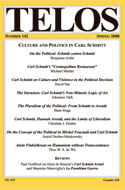On Tuesdays at the TELOSscope blog, we reach back into the archives and highlight an article whose critical insights continue to illuminate our thinking and challenge our assumptions. Today, Michael Gorup looks at Hans Sluga’s “The Pluralism of the Political: From Carl Schmitt to Hannah Arendt,” from Telos 142 (Spring 2008).
 The ostensibly simplest questions are always the most deceiving. Socrates, of course, knew this quite well. His childlike questioning, more often than not met with awestruck confusion, has continued to animate philosophical discourse for well over two millennia. The Socratic inheritance—mostly evidently exemplified by the “what is . . . ?” question structure—forms the implicit grounding for Hans Sluga’s comparative study of the political thought of Carl Schmitt and Hannah Arendt. The key question here, of course, is that of politics: namely, “What is politics?” The writings of Arendt and Schmitt form the two most significant twentieth-century corpuses that attempt to answer precisely this question. In Sluga’s account, the primary issue at hand in thinking the political is, for both Arendt and Schmitt, the question of pluralism (or in Arendt’s idiom, plurality). For both thinkers it is fundamental for politics that we are both many and different, though this ontological grounding plays out quite differently in either case.
The ostensibly simplest questions are always the most deceiving. Socrates, of course, knew this quite well. His childlike questioning, more often than not met with awestruck confusion, has continued to animate philosophical discourse for well over two millennia. The Socratic inheritance—mostly evidently exemplified by the “what is . . . ?” question structure—forms the implicit grounding for Hans Sluga’s comparative study of the political thought of Carl Schmitt and Hannah Arendt. The key question here, of course, is that of politics: namely, “What is politics?” The writings of Arendt and Schmitt form the two most significant twentieth-century corpuses that attempt to answer precisely this question. In Sluga’s account, the primary issue at hand in thinking the political is, for both Arendt and Schmitt, the question of pluralism (or in Arendt’s idiom, plurality). For both thinkers it is fundamental for politics that we are both many and different, though this ontological grounding plays out quite differently in either case.







